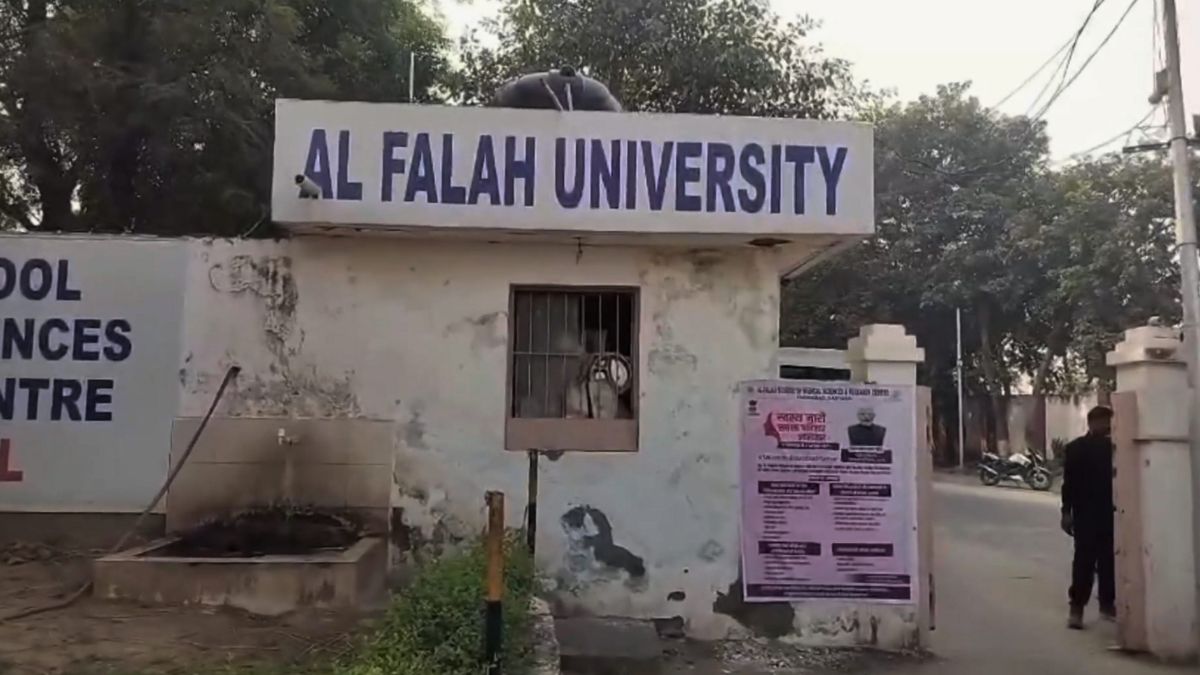Hours after police busted a terror module in the neighbouring Faridabad, a powerful explosion rocked Delhi on Monday (November 10) evening. A blast in a Hyundai i20 at the traffic signal near Gate No.1 of Red Fort Metro Station at 6.52 pm killed at least nine people and injured over a dozen others in the national capital.
As per reports, there could be a possible link between the two incidents. On Tuesday (November 11), the Haryana Police raided the Al Falah University in Dhauj, Faridabad, in connection with the blast near Delhi’s Red Fort.
Let’s take a closer look.
Why Al Falah University is in focus
The Al Falah University in Faridabad has come under scanner after the arrest of three doctors linked to the varisty in a suspected terror module.
Kashmiri doctors Muzammil Shakeel and Umar Mohammed, as well as Shaheen Shahid, a resident of Lucknow, have made headlines for their alleged involvement in terror activities. All three have links to the varsity.
The Haryana Police raided the Al Falah University, a day after the blast near the iconic Red Fort.
Delhi Police sources told Indian Express that the man, identified as Umar Mohammad, a Pulwama resident and a doctor, driving the vehicle involved in the Delhi blas t, allegedly had links to the Faridabad terror module.
As per preliminary findings, ammonium nitrate, fuel oil and detonators may have been used in the blast near the parking area of the Red Fort Metro Station. “Final reports are awaited,” the source said.
Dr Shaheen Shahid, who reportedly has links to the Al-Falah University, is a resident of Lucknow’s Lal Bagh, officials told NDTV. She was allegedly tasked with setting up the women’s wing of the Pakistan-based terror outfit Jaish-e-Mohammed (JeM) in India, Delhi Police sources said to the news channel.
The JeM’s women’s wing, Jamaat ul-Mominaat, is headed by JeM founder Masood Azhar ’s sister, Sadia Azhar, in Pakistan.
How the Faridabad terror module was busted
Police have busted a “transnational module” tied to JeM and Ansar Ghazwatul-Hind, spanning several states in India. It all began after multiple JeM posters appeared at different locations in Bunpora, Nowgam, on the outskirts of Srinagar, threatening police and security forces on October 19.
Investigation into the case revealed a “white-collar terror ecosystem”, the police said. This network involved radicalised professionals and students allegedly in touch with handlers in Pakistan and other countries, as per Times of India (TOI).
“The group was using encrypted channels for indoctrination, coordination, fund movement, and logistics. Funds were raised through professional and academic networks under the guise of social and charitable causes. The accused were found involved in identifying individuals for radicalisation, initiating and recruiting them into militant ranks, raising funds, arranging logistics, and procuring arms, ammunition, and materials for preparing IEDs,” a Jammu and Kashmir Police spokesperson said on Monday.
The police arrested 35-year-old doctor Muzammil Shakeel, who is from J&K’s Pulwama and a teaching faculty at Al-Falah University, on October 30 in connection with the posters.
His interrogation led the Haryana and J&K police to two rented places in Faridabad and the discovery of a huge cache of explosive material and ammunition.
“Shakeel used to teach at Al-Falah University in Dhauj, Faridabad, and had taken a room on rent there to store his belongings," Faridabad Police Commissioner Satender Kumar Gupta reportedly said.
The police said that on Sunday, they seized around 360 kg of explosives suspected to be ammonium nitrate, one Carom Cok rifle, two automatic pistols, 84 cartridges, five litres of chemicals, 20 timers with batteries and 14 bags from his room, as per PTI.
Searches continued on Monday, expanding to Dehar Colony in Dhauj, where police recovered an additional 2,563kg of explosives and flammable material. Weapons such as a Chinese pistol, a Beretta pistol, an AK-56 rifle, and a Krinkov rifle — all with ammunition – were also found. “The sheer volume of material points to plans for large-scale terrorist attacks,” a police officer was quoted as saying by TOI.
Calling it a “major counter terrorism success”, the police said in a release that the Kashmiri doctor was among seven people arrested in connection with the module.
Investigators have also detained several people allegedly linked to Shakeel, including a religious scholar from a mosque near the university in Faridabad.
Police said they are looking into whether laboratory facilities at Al-Falah University were planned to be used for synthesising advanced explosives such as RDX, TOI reported.
Shakeel’s arrest led the police to another Pulwama doctor, Adil Ahmad Rather, in Uttar Pradesh’s Saharanpur.
“Another of our teams went to Saharanpur and arrested the doctor. On the information provided by him, we recovered an AK rifle from a locker in the Government Medical College in Anantnag,” a source told Indian Express.
As per sources, Rather, who hails from Qazigund in south Kashmir, was working as a senior resident at GMC Anantnag last year. He left the job to work at a private hospital in Uttar Pradesh.
An AK-47 allegedly linked to Muzammil Shakeel was found in the Swift Dzire of a woman doctor from the same university. According to investigators, the car that was used to store the assault rifle, a pistol, and ammunition belonged to Dr Shaheen Shahid.
With inputs from agencies
)